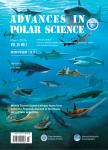Genome of a thermophilic bacterium Geobacillus sp. TFV3 from Deception Island, Antarctica
Genome of a thermophilic bacterium Geobacillus sp. TFV3 from Deception Island, Antarctica作者机构:Biotechnology Research InstituteUniversiti Malaysia SabahJalan UMS88400 Kota KinabaluSabahMalaysia Instituto Antártico ChilenoPlaza Munoz Gamero 1055Punta ArenasChile School of Biological ScienceUniversiti Sains MalaysiaPersiaran Bukit Jambul 11900 Bayan LepasPenangMalaysia Department of Biomedical ScienceFaculty of Medicine and Health SciencesUniversiti Putra Malaysia43400 UPM SerdangSelangor Darul EhsanMalaysia Universidad de AntofagastaFacultad de Ciencias del Mary Recursos BiologicosDepartamento de BiotecnologiaLaboratorio de Complejidad Microbianay Ecología FuncionalInstituto AntofagastaChile National Antarctic Research CentreUniversity of Malaya50603 Kuala LumpurMalaysia
出 版 物:《Advances in Polar Science》 (极地科学进展(英文版))
年 卷 期:2020年第31卷第2期
页 面:146-152页
核心收录:
学科分类:0710[理学-生物学] 07[理学] 071007[理学-遗传学]
基 金:funding support from the Ministry of Science Technology and Innovation(MOSTI) Malaysia under the Antarctica Flagship Programme(Sub-Project 1:Grant no.FP1213E036)
主 题:temperature 16SrDNA genomes Geobacillus Deception Island
摘 要:Thermophilic microorganisms have always been an important part of the ecosystem,particularly in a hot environment,as they play a key role in nutrient recycling at high temperatures where most microorganisms cannot *** most of the thermophiles are archaea,thermophiles can also be found among some species of *** bacteria are very useful in the fundamental study of heat adaptation,and they are also important as potential sources of thermostable enzymes and ***,we have isolated a Gram-positive thermophilic bacterium,Geobacillus ***3 from a volcanic soil sample from Deception Island,*** project was undertaken to analyze the genes of this thermophilic Antarctic bacterium and to determine the presence of thermal-stress adaptation proteins in its *** genome of Geobacillus ***3 was first purified,sequenced,assembled,and *** complete genome was found to harbor genes encoding for useful thermal-stress adaptation *** majority of these proteins were categorized under the family of molecular chaperone and heat shock *** genomic information could eventually provide insights on how the bacterium adapts itself towards high growth temperatures.



